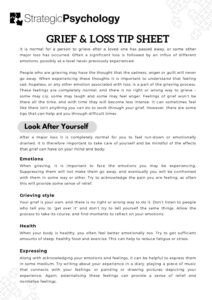
Grief & Loss Tip Sheet
862 KB
It is normal for a person to grieve after a loved one has passed away, or some other major loss has occurred. Often a significant loss is followed by an influx of different emotions, possibly at a level never previously experienced.
People who are grieving may have the thought that the sadness, anger or guilt will never go away. When experiencing these thoughts it is important to understand that feeling sad, hopeless, or any other emotion associated with loss, is a part of the grieving process. These feelings are completely normal, and there is no right or wrong way to grieve – some may cry, some may laugh and some may feel anger. Feelings of grief won’t be there all the time, and with time they will become less intense. It can sometimes feel like there isn’t anything you can do to work through your grief. However, there are some tips that can help aid you through difficult times.
Look After Yourself
After a major loss it is completely normal for you to feel run-down or emotionally drained. It is therefore important to take care of yourself and be mindful of the effects that grief can have on your mind and body:
Emotions – When grieving, it is important to face the emotions you may be experiencing. Suppressing them will not make them go away, and eventually you will be confronted with them in some way or other. Try to acknowledge the pain you are feeling, as often this will provide some sense of relief.
Expressing – Along with acknowledging your emotions and feelings, it can be helpful to express them in some medium. Try writing about your experience in a diary, playing a piece of music that connects with your feelings, or painting or drawing pictures depicting your experience. Again, externalising these feelings can provide a sense of relief and normalise feelings.
Health – When your body is healthy, you often feel better emotionally too. Try to get sufficient amounts of sleep, healthy food and exercise. This can help to reduce fatigue or stress.
Grieving style – Your grief is your own, and there is no right or wrong way to do it. Don’t listen to people who tell you to “get over it” and don’t try to tell yourself the same things. Allow the process to take its course, and find moments to reflect on your emotions.
Triggering events – Events such as anniversaries of the loss, birthdays or holidays can re-awaken grief, pain or memories. Try to recognise that events like these can be a part of grieving and try to be aware of them so that you can source additional support from loved ones or professionals at these times.
Triggering activities and people – There may be certain activities or people that are associated with your grief. For example, there may be a particular social group, family gathering or leisure activity that you used to participate in with the person who passed away. Grief often involves the urge to avoid these activities due to fear of how they will make us feel. If these people and activities are important to you, a helpful part of moving through grief can be re-engaging with these activities (with support) and learning to appreciate and enjoy them in a different way.
Seek Support
A very important part of the grieving process involves communicating your feelings or emotions with others. Many people may not feel comfortable doing this, however, it is often very helpful for those who are grieving to talk to supportive others about their experience as it often helps to relieve some of their pain.
Turning to friends and family – Friends and family members can provide an excellent support group for you during your grief. Try not to avoid these people when you are grieving, because although it is important for you to be alone at times, it is equally important not to push loved ones away.
Faith – If you are religious it can be very helpful (particularly after the death of a loved one) to use your faith during your grieving process. Religious communities can often also be tremendous sources of social and practical support after the death of a loved one.
Support groups – Grieving can be very isolating, especially when you are doing it alone. Try joining a support group with other people who are grieving. Often these particular gatherings can help to put your experience into perspective, and can demonstrate that you are not the only one who is going through it.
Talk to a psychologist or GP – If your grief feels so intense that you cannot cope effectively on your own or with the aid of friends and family, talk to a health professional such as a GP or Psychologist.
